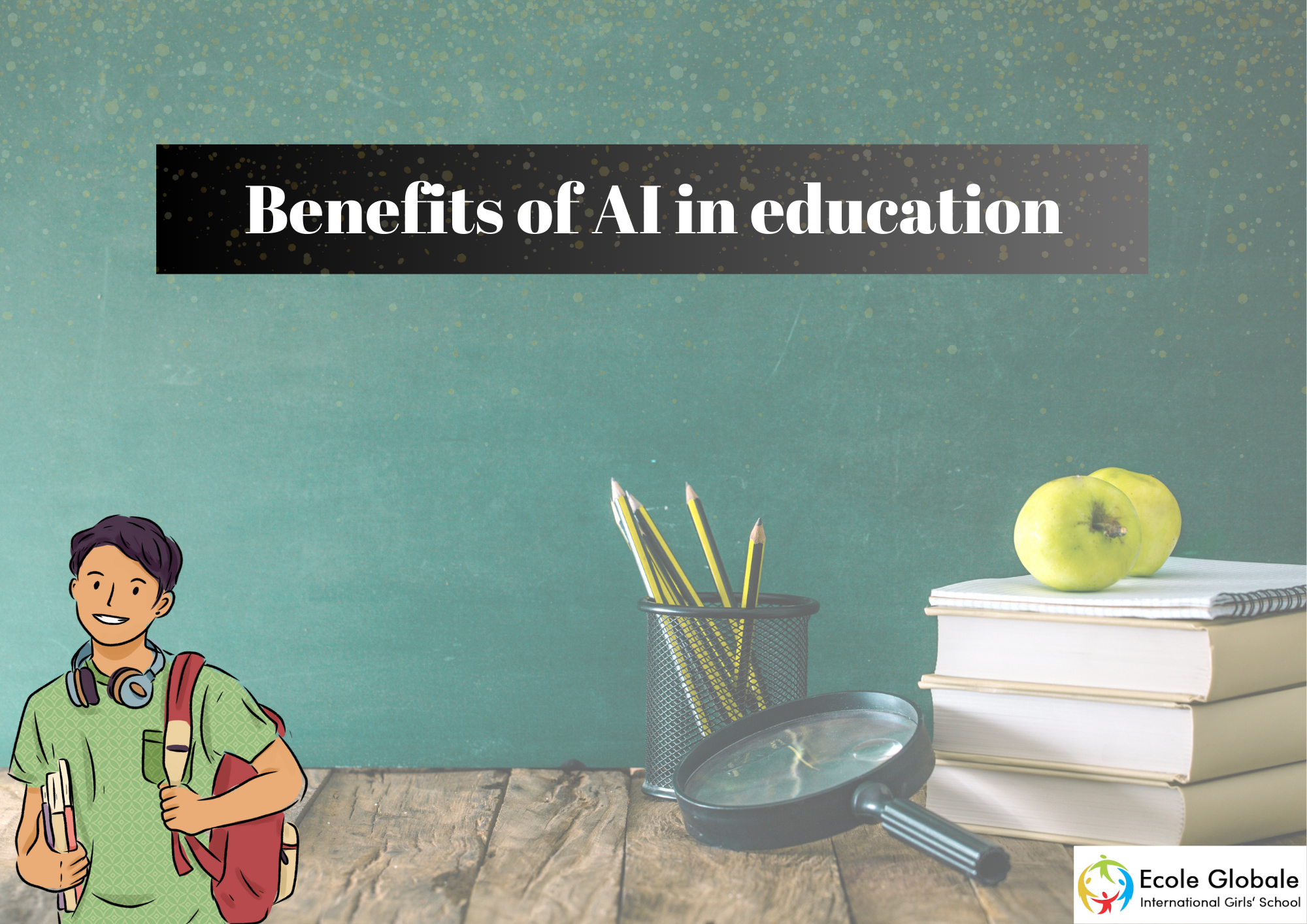In the ever-evolving landscape of technology, Artificial Intelligence (AI) has emerged as a transformative force, and its influence is making significant inroads into the field of education.
The integration of AI in education is not just a trend; it’s a paradigm shift that holds the potential to revolutionize how we teach and learn.
What are the benefits of ai in education?

Artificial Intelligence (AI) in schools has emerged as a transformative force, reshaping the landscape of education.
Integrating AI technologies into the educational system has proven to be a game-changer, enhancing the learning experience for both students and educators in boarding schools in India.
AI-powered tools facilitate personalized learning by adapting to individual students’ needs, allowing for a more tailored and effective approach to education.
These technologies also streamline administrative tasks, enabling educators to focus more on teaching and mentoring.
Furthermore, AI contributes to the development of critical skills such as problem-solving, creativity, and collaboration, preparing students for the demands of the rapidly evolving job market.
However, as we embrace the benefits of AI in education, it’s essential to navigate ethical considerations, privacy concerns, and ensure that technology remains a tool for empowerment rather than a source of inequality.
The integration of AI in schools is not just a technological advancement; it represents a paradigm shift in the way we perceive and engage with education, fostering a dynamic and adaptive learning environment.
Boarding schools, with their rich history and commitment to academic excellence, are poised to embrace the transformative power of Artificial Intelligence (AI) to enhance various aspects of education.
From optimizing administrative processes to personalizing learning experiences, AI offers a plethora of opportunities to benefit both students and faculty.
Administrative Efficiency:

One of the immediate benefits of AI in education is the streamlining of administrative tasks. AI-powered systems can automate routine processes such as attendance tracking, scheduling, and resource management.
This not only reduces the burden on administrative staff but also minimizes the likelihood of human errors, ensuring a more efficient and error-free operation of the school.
Educators often find themselves buried under administrative tasks that consume valuable time. AI can streamline these processes, handling routine administrative duties such as grading, scheduling, and data analysis.
By automating these tasks, teachers can focus more on the human aspect of education—building relationships with students and designing innovative teaching strategies.
Personalized Learning:

Every student is unique, with different learning styles and paces. AI can play a pivotal role in personalizing education by analyzing individual student data to tailor lessons and assignments according to their strengths and weaknesses.
Adaptive learning platforms can provide real-time feedback, enabling teachers to address specific needs and fostering a more engaging and effective learning environment.
One of the most promising aspects of benefits of AI in education is its ability to tailor learning experiences to individual students. Traditional classrooms often struggle to accommodate diverse learning styles and paces.
AI, however, can analyze each student’s strengths and weaknesses, adapting lessons in real-time to cater to their unique needs. This personalized approach fosters a more engaging and effective learning environment.
Enhanced Teaching Tools:

AI-powered educational tools can serve as valuable aids for teachers. From virtual reality simulations to intelligent tutoring systems, these tools can provide interactive and immersive learning experiences. Teachers can leverage AI to create dynamic lesson plans, incorporate multimedia elements, and assess student progress more comprehensively.
Imagine having a tutor available 24/7, capable of providing instant feedback and guidance. benefits of AI in education makes this a reality with Intelligent Tutoring Systems (ITS). These systems leverage machine learning algorithms to assess a student’s performance and offer targeted assistance.
Whether it’s solving complex math problems or improving language skills, AI tutors can address gaps in understanding and support students at their own pace.
Predictive Analytics for Student Success:

By analyzing historical data, AI can help predict student performance trends and identify potential challenges early on. This proactive approach enables educators to intervene and provide additional support to students who may be at risk of falling behind.
Predictive analytics can contribute to a more targeted and effective intervention strategy, ultimately improving overall student success rates.
Data-driven insights are a cornerstone of effective education. AI’s analytical capabilities can be harnessed for predictive modeling, helping educators identify patterns and trends in student performance.
By foreseeing potential challenges, educators can intervene early, offering targeted support to prevent learning gaps and enhance overall student success.
Parental Engagement:

benefits of AI in education can also enhance communication between the school and parents. Chatbots and virtual assistants can provide real-time updates on student progress, upcoming events, and other relevant information.
This not only keeps parents informed but also fosters a stronger partnership between the school and families, creating a supportive network for students.
Safety and Security:
Boarding schools prioritize the safety and well-being of their students. AI-powered surveillance systems can enhance campus security by detecting unusual activities or potential threats.
Additionally, AI algorithms can be employed to analyze student behavior patterns, identifying signs of distress and allowing for timely intervention.
AI has the potential to bridge educational gaps by making learning more accessible. For students with special needs, AI-powered tools can provide customized assistance, ensuring that education is inclusive and accommodating to diverse abilities.
Furthermore, language translation features can break down language barriers, opening up educational resources to a global audience.
As the job market evolves, the need for continuous learning becomes paramount. AI facilitates lifelong learning by providing personalized recommendations for skill development.
Adaptive learning platforms powered by AI can suggest courses and resources based on an individual’s career goals and emerging industry trends, fostering a culture of ongoing education.
The integration of AI in education is not about replacing teachers but empowering them. By leveraging the benefits of AI in education, educators can create dynamic and personalized learning experiences that cater to the needs of each student.
As we embrace the era of smart education, the synergy between human intelligence and artificial intelligence holds the key to unlocking the full potential of learners worldwide.
Incorporating AI into the fabric of boarding school operations holds tremendous potential for elevating the overall educational experience. From administrative efficiency to personalized learning and enhanced safety measures, the benefits of AI in education are diverse and impactful.
By embracing these technological advancements, boarding schools can not only stay at the forefront of education but also provide a more holistic and enriching environment for their students.









